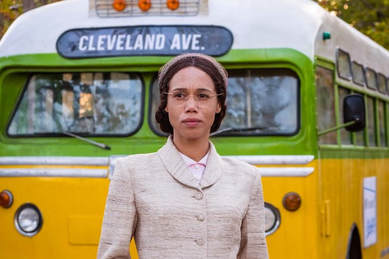 Let’s just get it out there: the Chibnall era of Doctor Who just had it’s first masterwork, and while I could just spend this whole article talking about how good the thing was, it’s probably best to just establish that yes: this was not just good, it was great. Rosa follows in a big long tradition of episodes that when you hit them in a new Doctor’s first series shout, “This is what we’re doing, by the way!” In the last era of the show, we hit that with “Listen”, an episode that eschewed having a villain at all, and was entirely about character motivations, flaws, and their consequences. It acted as a mission statement for the rest of the era: the major villains were more fleshed out, and given complex motivations. The focus was on close and deep relationships, and peeling them back, or breaking them. Here, we see a new focus exposed, and a whole new angle on the show becomes clear. Like our previous two episodes, the Doctor drops right into the middle of someone else’s story. Her job isn’t to be the most important person in the story, she’s drifting in and out of other people’s stories. Her motivations aren’t the driving force of the episodes, the guest stars are. This was confusing to a lot of folks last week, where we get dropped in the middle of a race and the two strangers we meet are given more character moments then our main cast. But that’s the new take—Doctor Who is now a show about butting into other stories, and helping those stories to finish better than they would have otherwise. That we were introduced to the Doctor by literally having her drop into the middle of a situation, now in hindsight, seems like a neon sign telling us this was where we were going. Which ends up being the perfect way to handle a story about someone like Rosa Parks, doesn’t it? I had a lot of fears about how this would be handled going into this episode, but none of them panned out. The Doctor and friends’ goal isn’t to inspire or create Rosa’s heroism, but simply to preserve it. Rosa Parks is the episode’s protagonist, and she gets full credit for her own actions. Notably, the episode doesn’t allow the white characters to glory in their success. The move of forcing the white characters to be complicit in allowing Rosa be taken off the bus, and Graham’s cry of “I don’t want to be a part of this!” with the Doctor’s terse, “You are,” as a reply removes any sense of joy at her action from the moment: it’s horrible, it’s uncomfortable, and it should be. And it’s heroic, but heroic for the right person. The Doctor confronts the cosmic racist, but it’s Ryan who gets to actually get rid of him. The moments are given to the right people. It’s careful. It’s also notable that the villain’s motivation is just that he’s a big giant racist. That’s actually enough. His method of trying to change history however, is where we get into some of our other recurring themes of the season. See, he was installed with an implant that makes it so he can’t hurt or kill anyone against his will. Which marks three episodes in a row where we have people with things put into their body without their consent. It was possible, however unlikely, that two weeks in a row was just a very specific co-incidence. Three in a row? Bodily autonomy IS the theme of this series of Doctor Who, and what that means going forward is very interesting. It’s also fitting that Rosa Parks was chosen as the figure to fit into that theme. Her act of protest, not moving physically from a space so that someone else can occupy it, is a physical and tangible act of protest. Her very bodily presence is the protest. There are plenty of other civil rights activists who could have had a story about them, but Rosa Park’s story fits into the themes we’ve seen this series in a way that is particularly snug. The way Team TARDIS goes the minutia of Rosa Park’s life, the personal details of her life and her schedule, is also small and intimate in a way we’ve never seen before since they show was revived—as much as I’m here to dissect big themes, Chibnall continues to be more concerned with the tiny moments people live in. Another tiny set of moment is the mention of Artron Energy, vortex manipulators, and of Stormcage (the prison River Song was held in). We are in a new era, but what a comfort to know that the past isn’t forgotten. We can live on in the future, but don’t forget the past. And that is a theme of the episode itself—maybe the most surprising scene was the one in which Ryan and Yaz are hiding behind a dumpster, and acknowledge that while things got better, racism isn’t gone. They’re still living and fighting against it, and it didn’t vanish. It would have been easy to celebrate what Rosa Parks did as a pure and complete victory, but while staying within the realm of child friendly, it doesn’t erase how long it took for her to get the recognition she deserved, or how she lost her job after staying in her seat on that bus. As much as the episode is very much about what an amazing person Rosa Parks was, it never makes her heroism in taking a stand against brutal, humiliating, violent forces something she is reveling in. It’s awful. When it happens today, it’s still awful. We end on a shot of the asteroid Rosa Parks, which is such a different take on a legacy. In previous episodes where we see the legacy of someone in the future, it’s been something from an imagined future (a copy of a future printing of an Agatha Christie novel, for example) or a personal view on a person’s legacy (the curator in “Vincent and the Doctor”’s wonderful speech about Vincent’s life). Here, the legacy we see is a physical object, built into memory. Like the Ghost Monument, our memories are not just in stories, they are in manifestations. You can love a dream, but you cannot show it to someone else. You cannot feed a man bread made of fiction. Our bodies are matter, and the decision to show her legacy in a real object is a manifesto of that. A declaration that we have a right to a place in the universe. To exist, to breathe, to live in our bodies in our own space. And no one has the right to take that agency away.
0 Comments
Leave a Reply. |
James Wylder
Poet, Playwright, Game Designer, Writer, Freelancer for hire. Archives
October 2023
Categories
All
|

 RSS Feed
RSS Feed